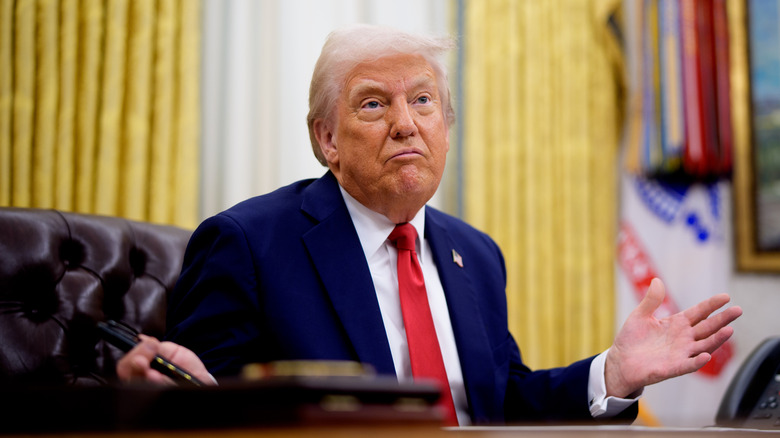Temu's Key To Success Just Got Shut Down, And It Could Change Everything
The latest round of tariffs announced by President Donald Trump has stirred quite some upheaval across industries. From Jaguar Land Rover pausing U.S. shipments to Nintendo halting pre-sale of its highly anticipated Switch 2, all major players conducting business across international waters are bracing for a serious impact. But it's not just high-volume, big-value transactions that are at risk, but also direct-to-consumer businesses that have avoided the impact of tariffs for years.
Shein and Temu, in particular, are facing an almost existential crisis due to the repeal of a long-standing exemption for low-cost shipments. The exemption in question is called de minimis, which saves low-cost items coming into the U.S. from getting taxed. That formed the bulk of Temu and Shein's order, which also led to their explosive growth in the U.S. According to the International Trade Administration, imported items in the U.S. worth $800 or less in value are not subject to any tariffs, taxes, or fees.
So, how much are the costs going to rise for Shein orders from China after the policy change? As per a fact sheet shared by the White House, packages coming from China or Hong Kong will incur a duty worth 30% of their net value, or $25 per item. The fee will climb to $50 in June. That's a high fee, as a healthy bunch of items available on these platforms cost the same, which means the final sticker price is essentially going to double on the bill for U.S.-based customers.
Why is it being pulled?
The de minimis value, which is essentially a duty-free import threshold, was raised by Congress from $200 to $800 in 2016. Eliminating this exemption will directly hit the wallet of shoppers, particularly those using popular e-commerce sites like Shein and Temu in search of low-cost products and bargain deals. This affordable, fashion-forward approach — benefiting from duty-free travel from China to the U.S. — is what allowed these platforms to grow rapidly in scale and valuation. That golden period is now ending, putting the whole operational model in jeopardy.
In April 2025, President Donald Trump signed an executive order covering low-value imports from China, which puts an end to the duty-free de minimis movement of products into the U.S. borders. "The Secretary of Commerce has notified me that adequate systems are now in place to process and collect tariff revenue for covered goods from the PRC otherwise eligible for duty-free de minimis treatment under 19 U.S.C. 1321(a)(2)(C)," says the order. It covers all packages that are slated to leave warehouses on or after May 2, 2025.
Citing research economists at Nomura Holdings, a Bloomberg report notes that small value shipments comprise over one-tenth of all Chinese exports into the U.S. market, with Shein and Temu being the biggest contributors to the rapid growth of such shipments. So, why exactly is the de minimis benefit being axed? As per the executive order, it has to do with the supply of harmful drugs such as fentanyl. "These exports play a significant role in the synthetic opioid crisis in the United States," says the order.

